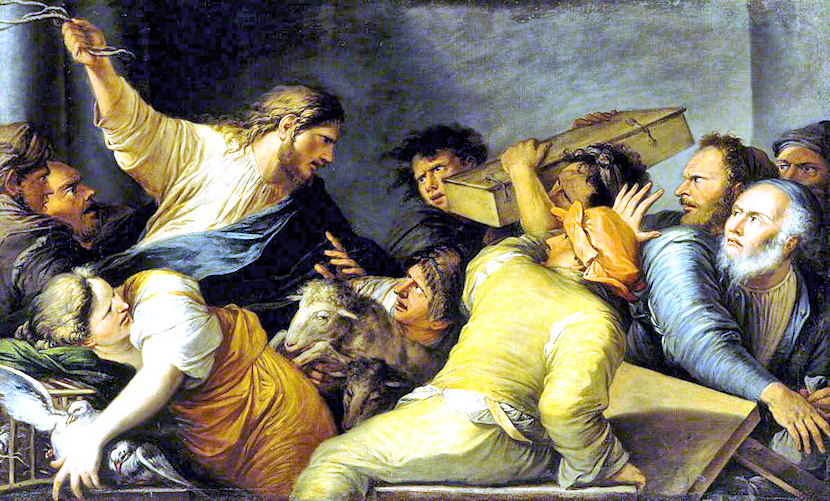In scripture, few episodes stand out as poignantly reflective of moral and spiritual fervor as Jesus’ expulsion of the moneychangers from the temple. The image of Jesus driving out the moneychangers is a powerful one, etched into the minds of believers across generations. It encapsulates Jesus’ vehement denunciation of corruption within the sacred precincts of worship itself, and stands as a stark symbol of His unwavering stance against the exploitation and commodification of faith.
This act, documented in the gospels (Matthew, Mark, Luke, and John), transcends its immediate context. It has become a timeless message against the perversion of worship — a practice meant to uplift the soul and connect it with the Divine, not to line pockets or accumulate earthly riches. It invokes the prophecy of Isaiah 56:7, which Jesus reiterates: “My house shall be called a house of prayer for all nations.”
This biblical narrative resonates with unsettling familiarity in today’s religious landscape. Certain churches and affluent pastors, masked by the patina of piety but mirroring the mercenary zeal of the ancient moneychangers, are criticized for repurposing worship and the devotion of their followers for financial prosperity. They preach what is colloquially termed a “prosperity gospel,” promising material blessings in exchange for unwavering loyalty and financial contributions. This approach, with roots in a capitalistic culture obsessed with profit, contradicts the very essence of worship.
The critique leveled against contemporary churches and their leaders, it seems, parallels the indignation Jesus exhibited. True worship, as revealed in scripture, is a deeper, internal experience. It doesn’t reside in ostentatious displays or the grandeur of physical structures. It is an introspective act, a communion between the individual and the divine that transcends physical spaces and ritualistic offerings. Jesus himself, in Matthew 6:6 underscores this personal dimension of worship, emphasizing its privacy and sincerity: “But when you pray, go into your room and shut the door and pray to your Father who is in secret…” Similarly, St. Paul’s exhortation in Romans to present one’s self as a “living sacrifice to God, dedicated to His service and pleasing to Him” emphasizes the personal nature of worship. It is not an external exhibition but an internal offering, whereby the faithful align themselves with God’s will through reflection, renewal, and acts of love.
The modern-day moneychangers often mimic worldly trends in their approach to worship. They borrow heavily from the entertainment industry, technology, and advertising, creating a spectacle that distracts from the core purpose of worship — communion with God. This outward focus, devoid of introspection and genuine connection, misses the mark. It exemplifies the conflation of spiritual and material aspirations, advocating a gospel of wealth that is antithetical to the essence of Christian worship; namely, the renewal of the person through the power of God’s word.
Jesus explains, in his conversation with the Samaritan woman at the well (John 4:23–24), that true worship is devoid of the trappings of worldly influence. It transcends physical locales and structures. It’s about connecting with the Divine “in spirit and in truth” within the depths of one’s own heart.
Let us, therefore, take to heart the message etched in the story of the moneychangers. Let us not allow our worship to be corrupted by worldly influences or personal agendas, but strive for heartfelt worship, not divorced from life, but centered on a living connection with Christ. When you realize what worship is, your whole life will become a successive act of worship in the way you follow Christ, in the way you treat one another: at work, at home, in school, in the gym, on the playground and during meals.
—Fr. Hugh Duffy











8 Comments
Barry Fraser
Thanks Fr. Hugh ,
Received your blog , looking forward to the spiritual journey with you.
God bless.
Hugh Duffy
Welcome to the website, Barry.
Paulette Leonard
Father Hugh,
Your message is a good reality check on understanding worship. It is not just attending weekly Mass but how we live our lives in relationship with everyone everyday everywhere. I really appreciate the music you tie in with scripture. I am going to share the song, God is with us, with my religion classes this week.
I look forward to your post every Saturday.
God bless,
Paulette
Hugh Duffy
You got it, Paulette. Thanks for the comment.
Dn Thomas E. Brandlin
Fr. Hugh, thank you for this fabulous take on fundraising. I am a deacon and a fund raiser, and learned long ago that both are a ministry. St. Ignatius and others of the great saints understood this point as well. However, I have to be careful in choosing clients’ projects to promote. Ministry is not a business. Blessed weekend.
Hugh Duffy
I appreciate your comment about fundraising, Thomas. My blog addresses worship specifically, and how it can be abused by modern-style money changers.
Tom Rooney
I remember as a youngster thinking how terrible if the chapel was full of cattle ,pigs and poultry
Bartholomew Okere
Fr. Duffy, this wkend catechesis has a deep meaning on religious revivals esp on the modern day prosperity preachers that masquerade themselves like the money changers in today’s gospel of John. You knelt the meaning of true worship to be focused on Mat’s gospel chapter 25ff.As you insightfully enrich others through your blog, may God bless you the more.
Shalom!